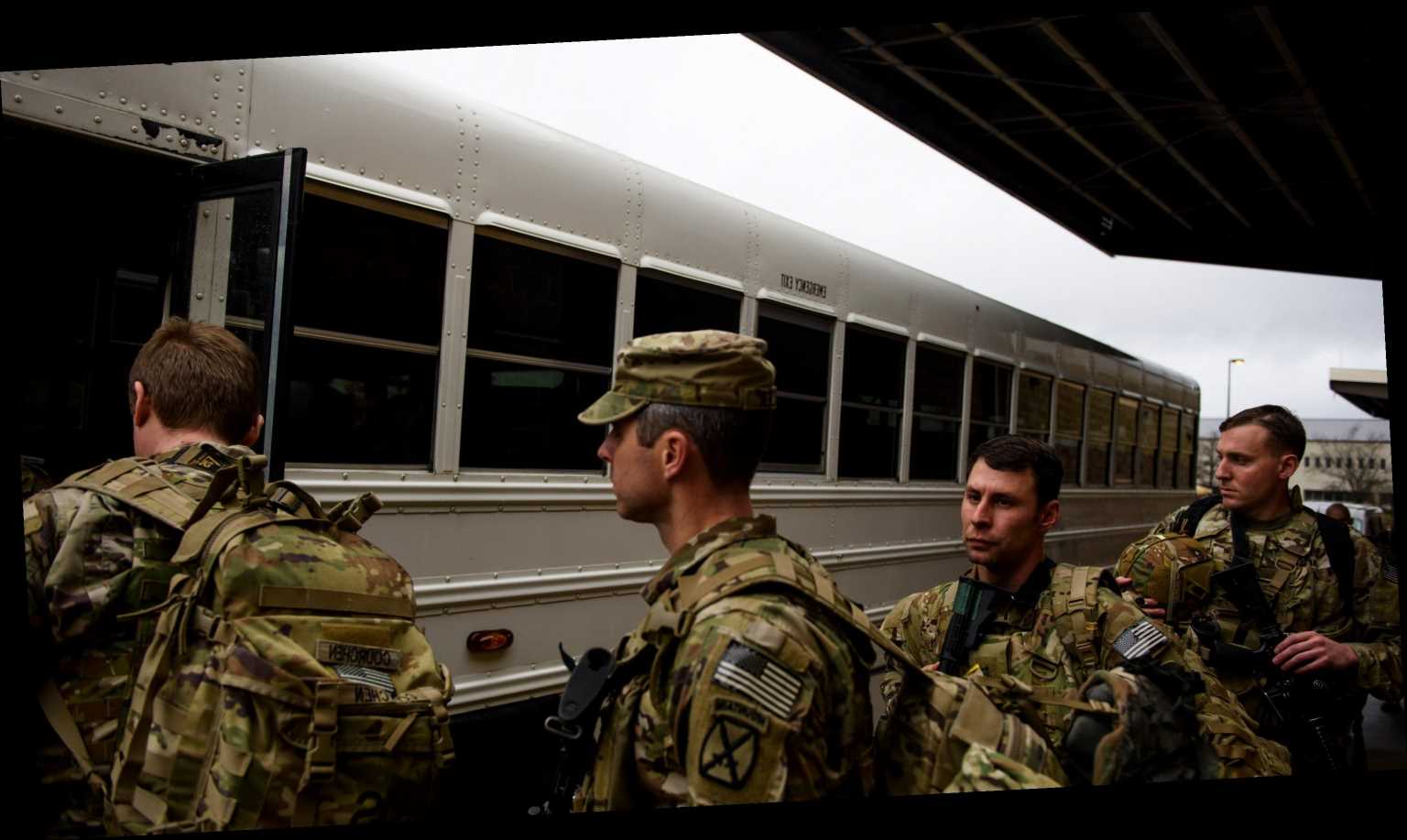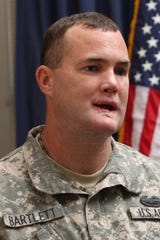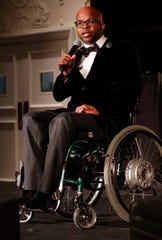Soldiers with the 82nd Airborne Division board a bus to be taken to a flight line as they deploy to the Middle East on Saturday, Jan. 4, 2020 at Fort Bragg, N.C. (Photo: Melissa Sue Gerrits, The Fayetteville Observer via AP)
The images are horrific. His left eyeball seemed to float in the bloody, mangled mass that used to be his face.
A bomb tore through the front of U.S. Army sniper Robert Bartlett’s head as he rode in a Humvee in Iraq in 2005. The device was traced to the Iranian Quds Force led by Gen. Qasem Soleimani.
So when President Donald Trump ordered the killing of the general last week, it wasn’t exactly an unwelcome development for Bartlett.
Bartlett, who’s now a motivational speaker and veterans’ advocate, and other veterans who have served in the Middle East agree on that much. They differ on what should happen next.
Army Sgt. Robert Bartlett was disfigured during deployment in Iraq in 2005. (Photo: American Society of Plastic Surgeons)
But their years patrolling in Humvees, enduring stinging sandstorms and dealing with extreme temperatures have given them important perspective as the nation – again – focuses its attention on conflict in the Middle East.
Some say the face-off with Iran, which retaliated with a missile strike on Iraq bases Tuesday night, has reminded the American public of the uncertainty service members and their families have faced for nearly two decades since the U.S. military first invaded Afghanistan.
Some say it’s time for Americans to cut our losses and bring U.S. troops home. Others say we need to keep our armed forces in place if it prevents another 9/11.
One message is clear: “Wars cost,” said Sherman Gillums Jr., a Marine veteran who was paralyzed as he prepared to ship out to Afghanistan in 2002.
“If you want it or believe it’s necessary but can’t fight it yourself, at least be prepared to pay in some other way,” Gillums said.
He is now chief strategy officer at American Veterans, or AMVETS, a nonprofit veterans’ advocacy organization with more than 250,000 members.
Make no mistake, Bartlett said: The United States is at war with Iran.
“We can keep lying to ourselves and say, ‘Hey, we’re not at war with them, we don’t want to be at war with them,’” he said. “Well, they’re at war with us, so you are at war with them.”
Ending the ‘forever war’
Americans may have pushed Iraq to the back of their minds as American forces there dwindled and Trump declared ISIS had been defeated. But veterans interviewed by USA TODAY said the recent hostilities with Iran are an escalation of a conflict that has been going on for years.
In 2001, when U.S. forces prepared to take a crucial airport in Afghanistan during the initial U.S. invasion, one of the first things they did was destroy the runways, said Joe Chenelly, a Marine veteran who took part. “So that the Iranians could stop bringing stuff in to them,” he said.
That’s why Bartlett reacted to Soleimani’s death the way he did.
“I just got overcome with emotion,” he said. “Reluctantly, I prayed for his soul and the others who were killed. … Then I went and celebrated with a 12-year-old Scotch and a cigar.”
Chenelly, who is now national executive director of AMVETS, said the organization has been in favor of ending the “forever war” for years. What happened in the past week, however, “obviously complicates things.”
Now, he said, the most important consideration should be ensuring the security of U.S. forces and the nation. But today’s highly charged political environment makes it hard, he said, for Americans to talk about how to achieve that.
“It’s hard to talk about this and not be labeled as taking one side or the other – the political side, which really isn’t fair when we’re talking about life and death,” Chenelly said. “It’s a lot deeper than Rs versus Ds or vice versa.”
National Executive Director of AMVETS Joe Chenelly poses for a photograph Thursday, March 29, 2018, in Washington. (Photo: Alex Brandon, AP)
Navy veteran Jeremy Butler said images of troops being deployed to the Middle East recently have returned to the national spotlight the realities of military life: “what it’s like to be on call, what it’s like to have family members quickly deployed, what it’s like to have the uncertainty of not knowing when you’re going to see your spouse or your parents again.”
Butler deployed in 2003 in support of the U.S. invasion of Iraq and is now chief executive officer of Iraq and Afghanistan Veterans of America, which advocates for post-9/11 veterans.
In addition to the 5,000 U.S. troops killed in combat operations in Iraq and Afghanistan, more than 50,000 have been wounded. Years later, those veterans require care by their families and American taxpayers.
Some veterans question what the U.S. is fighting for
Iraq combat veteran Paul Rieckhoff, the founder of Iraq and Afghanistan Veterans of America, said what’s missing from the national conversation about recent hostilities with Iran is a strategy.
Rieckhoff, who unabashedly refers to Trump as “President Mayhem” on his podcast, said the White House and Pentagon need to articulate a clear strategy for the region beyond economic sanctions meant to pressure Iran into dropping its nuclear ambitions.
Trump on Wednesday pledged to impose more of those sanctions in response to Iran’s missile strikes.
Iraq and Afghanistan Veterans of America Chief Executive Officer Jeremy Butler speaks during an IAVA gala in New York City on Nov. 7, 2019. (Photo: Brian Ach, Getty Images for IAVA)
Rieckhoff called Trump’s remarks nebulous. “Felt all over the place,” he tweeted.
Trump’s address signaled a de-escalation from his earlier rhetoric, in which he pledged to strike Iranian cultural sites “VERY FAST AND VERY HARD” if Iran retaliated for Soleimani’s killing.
Veteran Army Special Forces officer Joe Kent wants the president to go further and pull U.S. troops out of Iraq – and away from Iran. That’s what Trump campaigned on.
“I would get all of our forces out of … striking distance,” he said. Kent deployed several times to Iraq. His wife was killed in Syria last year during her fifth combat deployment.
“If we do decide to stay in Iraq, either against the will of the Iraqi parliament or at the blessing of the Iraqi government, the question is, what are we fighting for?” he asked. “Are we fighting for the Iraqi government?”
Sherman Gillums Jr., Executive Director of Paralyzed Veterans of America, speaks during the 3rd Annual Vetty Awards at The Mayflower Hotel on January 20, 2018 in Washington, DC. (Photo: Paul Morigi, Getty Images)
Marine veteran Dan Caldwell agrees. He said keeping troops in Iraq is “insane.” Caldwell is senior adviser to Concerned Veterans for America, a Koch-backed group that has supported Trump.
U.S. missions to eradicate ISIS and train and equip Iraqi forces are now complete, Caldwell said.
“The only mission our troops have in Iraq is guarding bases that no longer serve a purpose,” he said. “There’s no pressing national security need to have them there.”
Middle East experts have said a U.S. withdrawal from Iraq could be disastrous, creating a power vacuum for both Iran and the Islamic State terrorist group to fill.
And Bartlett, who was disfigured by the Iranian-made bomb in 2005, warned against such sweeping judgments without knowing what intelligence is guiding U.S. leaders’ decision-making.
The lessons of 9/11 are worth remembering, Bartlett said: A small group of terrorists can kill thousands of people. “So we’ve got to keep that in mind. When we don’t deal with it, then we lose a lot of civilians.”
Source: Read Full Article



